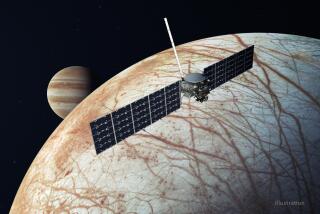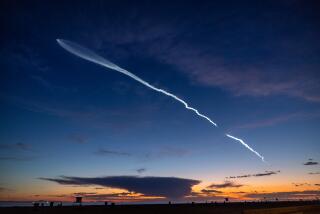Is Kepler dead? NASA to give update on planet-hunting telescope
- Share via
Is NASA’s Kepler planet-hunting telescope dead?
That was the rumor circulating Wednesday, nearly a week after the space telescope went into safe mode. NASA will host a news conference at 1 p.m. Pacific time “to discuss the status of the agency’s Kepler Space Telescope.” To some, it sounds ominous.
“Not sure I like the sound of this,” tweeted Nancy Atkinson, a senior writer and editor for Universe Today.
“Kepler, we have a problem,” added Paul Crowther, a professor of astrophysics at the University of Sheffield in Britain.
And Caltech’s always quotable Michael Brown (the planetary scientist who demoted Pluto to dwarf planet status) tweeted: “Hmmm, well, Kepler was fun. What’s next?”
Kepler launched on March 6, 2009, to begin a 3½-year mission to scour the Milky Way galaxy for signs of Earth-sized planets that could potentially support life. The thinking goes that they must orbit their stars in the “Goldilocks zone” — not too close and not too far, but in the middle zone where water (should there be any) would be in liquid form and temperatures would be “just right” for life.
As of Day 1,530 of its mission, Kepler has confirmed the existence of 132 such exoplanets (planets outside our solar system) and identified 2,740 more exoplanet candidates. Ultimately, the craft should help scientists calculate how many of the hundreds of billions of stars in the Milky Way could have planets capable of supporting life.
NASA engineers contact Kelper twice a week. When they checked in on May 3, they found Kepler in “a self-protective state called a safe mode.” They were able to get it to collect scientific data again, and the telescope sent back data on May 5, a few days ahead of schedule, the agency said.
Where things go from here is now anyone’s guess.
The NASA officials scheduled to speak at the news conference include John Grunsfeld, associate administrator of the Science Mission Directorate; Paul Hertz, the astrophysics director; William Borucki, Kepler science principal investigator; and Charles Sobeck, deputy project manager.
NASA had planned to host a Kepler Science Conference at the Ames Research Center in November, but those plans are being reassessed in light of the federal budget sequestration.
Return to Science Now.







